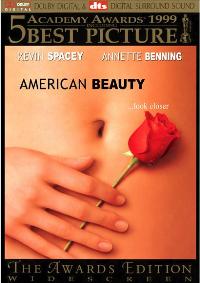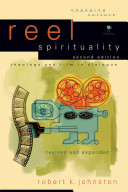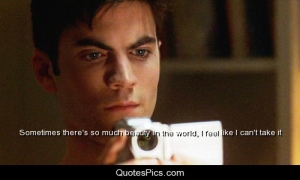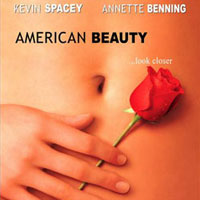 American Beauty received a lot of buzz when it first came out in 1999, not only because it won itself five Academy Awards including best picture in 2000 but more so because of the common reaction of “What was it about?”
American Beauty received a lot of buzz when it first came out in 1999, not only because it won itself five Academy Awards including best picture in 2000 but more so because of the common reaction of “What was it about?”
A quick glance at the Wikipedia alone tells you the complexity of its interpretation. Accordingly, “academics” offered several possibilities. Some of the observations include “imprisonment and redemption”, “conformity and beauty”, “sexuality and repression”. Obviously, several major themes are played out in this movie. It’ll be simplistic to categorize it under one title and see everything through that single lens. And, after saying that, my attempt here is to highlight a literary message in this film that I have yet to hear its discussion. But first, I would like to quote from Reel Spirituality written by Robert Johnston from Fuller Theological Seminary. It’s a bit lengthy quote but it is beautifully written.
The movie is a dark comedy and not for the easily offended. It portrays the wholeness of suburbia’s chase after the American dream – after money, status, youth, and, of course, beauty. The story is gorgeously bleak, The filmic equivalent of a John Updike novel about a hero’s midlife crisis. It is also laced with profanity and nudity, adultery and drug use.
 As the story unfolds, we might think that the theme of American Beauty is going to be, “Eat, drink, and be merry, for tomorrow we die.” But the movie is anything but sensational. It’s iconoclasm marks our media-generated illusions without resorting to either a simple fatalism or a perverse cynicism. Lester Burnham, the film’s hero, is ignored by his wife, bored by his work, and unloved by his daughter. He is shriveled of soul until an infatuation with his daughter’s cheerleader friend shocks him alive. He literally begins to smell the roses. Despite being a near caricature of middle-class life today, the movie’s portrayal of a man who does not know what his role in life is and fears growing old is all too real. “I’ll be dead in a year,” Lester tells us as the movie opens. “In a way, I’m dead already.” But much like the book of Ecclesiastes, despair does not have the final word. (Reel Spirituality, pp.101-102.)
As the story unfolds, we might think that the theme of American Beauty is going to be, “Eat, drink, and be merry, for tomorrow we die.” But the movie is anything but sensational. It’s iconoclasm marks our media-generated illusions without resorting to either a simple fatalism or a perverse cynicism. Lester Burnham, the film’s hero, is ignored by his wife, bored by his work, and unloved by his daughter. He is shriveled of soul until an infatuation with his daughter’s cheerleader friend shocks him alive. He literally begins to smell the roses. Despite being a near caricature of middle-class life today, the movie’s portrayal of a man who does not know what his role in life is and fears growing old is all too real. “I’ll be dead in a year,” Lester tells us as the movie opens. “In a way, I’m dead already.” But much like the book of Ecclesiastes, despair does not have the final word. (Reel Spirituality, pp.101-102.)
 The director has a creative way of describing vanity, borrowing the term from “the teacher” as suggested by Johnston (Ecclesiastes literally means “the teacher”). Almost every character in the movie is flawed. Lester’s wife is a high energy successful real estate broker. But behind the facade of success, she often sobs uncontrollably. The militant, gay-hating neighbor is an abusive father and a closet homosexual. His son Ricky pretends to be a “straight kid” who lives a disciplined life but actually sells marijuana and has no respect for his father. Lester’s daughter Jane is like any teenagers – insecure and unsure of herself. Her friend Angela, the beautiful and sexy cheerleader whom Lester lusts after, turns out to be living in a lie of glamour. She is just as insecure and unsure of herself as Jane. The only two normal and healthy people in the entire movie are the gay couple who live next door to the Burham’s. Not to be politically incorrect, but the fact that they are gay (in the context of 1999) is the director’s way of saying that they are “flawed” like the others. But above all, Lester is the culmination of being a mess. There is no “normal”.
The director has a creative way of describing vanity, borrowing the term from “the teacher” as suggested by Johnston (Ecclesiastes literally means “the teacher”). Almost every character in the movie is flawed. Lester’s wife is a high energy successful real estate broker. But behind the facade of success, she often sobs uncontrollably. The militant, gay-hating neighbor is an abusive father and a closet homosexual. His son Ricky pretends to be a “straight kid” who lives a disciplined life but actually sells marijuana and has no respect for his father. Lester’s daughter Jane is like any teenagers – insecure and unsure of herself. Her friend Angela, the beautiful and sexy cheerleader whom Lester lusts after, turns out to be living in a lie of glamour. She is just as insecure and unsure of herself as Jane. The only two normal and healthy people in the entire movie are the gay couple who live next door to the Burham’s. Not to be politically incorrect, but the fact that they are gay (in the context of 1999) is the director’s way of saying that they are “flawed” like the others. But above all, Lester is the culmination of being a mess. There is no “normal”.
 Jane’s boyfriend, Ricky, seems to be the “sage” in the movie. He records life around him with his video camcorder, and he often sees beauty behind ordinary things – at the end, even in Lester’s death. He sees through the vanity of his father’s anger, and he sees through the vanity of Angela’s pretense. Towards the end of the movie, he tells Angela in her face that she is only using Jane to make herself feel better. But the point of the movie is in the transformation in the character Lester Burham. Lester finds himself lost the purpose of life in his midlife crisis. He first loses his job. Then, his relationship with his wife and his daughter are breaking. And he fantasizes his daughter’s cheerleader friend Angela. At the same time, his character is continuously evolving in the movie. He begins to find meaning in the little things he likes since childhood in deviance to what society tells him. Even in his working out (with the intention to impress Angela) and smoking marijuana have some sense of “seizing the moment”. But the culmination of his transformation sublimates at the moment when Angela tells him that she’s still a virgin. Lester stops being the luster and becomes a father figure. Just before he is shot to death, he looks at his family picture and smiles. He finds his role in life. It doesn’t matter how long or short life is. What matters is that it is fulfilled. I suppose that’s the director’s message. The photography of the scene which Lester lies in his pool of blood is spectacular. The effect is one of beauty and not gruesome. When Ricky bends down and looks at Lester, he says “Wow. It’s beautiful!” In the midst of the profanity, nudity, drugs, broken relationships, we get a message from this film that life is filled with flaws and disappointment, but there is much beauty behind all these. You will see it when you find your role and fulfill it.
Jane’s boyfriend, Ricky, seems to be the “sage” in the movie. He records life around him with his video camcorder, and he often sees beauty behind ordinary things – at the end, even in Lester’s death. He sees through the vanity of his father’s anger, and he sees through the vanity of Angela’s pretense. Towards the end of the movie, he tells Angela in her face that she is only using Jane to make herself feel better. But the point of the movie is in the transformation in the character Lester Burham. Lester finds himself lost the purpose of life in his midlife crisis. He first loses his job. Then, his relationship with his wife and his daughter are breaking. And he fantasizes his daughter’s cheerleader friend Angela. At the same time, his character is continuously evolving in the movie. He begins to find meaning in the little things he likes since childhood in deviance to what society tells him. Even in his working out (with the intention to impress Angela) and smoking marijuana have some sense of “seizing the moment”. But the culmination of his transformation sublimates at the moment when Angela tells him that she’s still a virgin. Lester stops being the luster and becomes a father figure. Just before he is shot to death, he looks at his family picture and smiles. He finds his role in life. It doesn’t matter how long or short life is. What matters is that it is fulfilled. I suppose that’s the director’s message. The photography of the scene which Lester lies in his pool of blood is spectacular. The effect is one of beauty and not gruesome. When Ricky bends down and looks at Lester, he says “Wow. It’s beautiful!” In the midst of the profanity, nudity, drugs, broken relationships, we get a message from this film that life is filled with flaws and disappointment, but there is much beauty behind all these. You will see it when you find your role and fulfill it.
